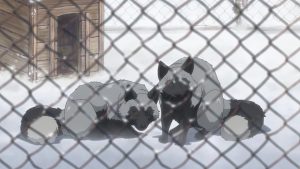 At the risk of being repetitive (who am I kidding, that ship has long sailed), Noda Satoru is the master of the supporting character. Every week he seems to go about proving my theory that everyone in this cast comes off like the protagonist of their own series, but rarely quite so literally. Tsukishima is hardly a minor character, but one really does get the sense that Noda has a dossier of these richly detailed backstories for everyone in the series, no matter how trivial to the plot, and can dust one off whenever he feels like it. It’s like Togashi and his world building – like “taking dictation from God”, as Salieri apocryphally said about Mozart.
At the risk of being repetitive (who am I kidding, that ship has long sailed), Noda Satoru is the master of the supporting character. Every week he seems to go about proving my theory that everyone in this cast comes off like the protagonist of their own series, but rarely quite so literally. Tsukishima is hardly a minor character, but one really does get the sense that Noda has a dossier of these richly detailed backstories for everyone in the series, no matter how trivial to the plot, and can dust one off whenever he feels like it. It’s like Togashi and his world building – like “taking dictation from God”, as Salieri apocryphally said about Mozart.
 There’s a bit of a check-in with the Asirpa-Kiroranke-Shiraishi party at the start of this episode, but make no mistake – this one is Sgt. Tsukishima’s show. Not that the prologue isn’t important, as it continues to reveal bits and pieces of what the mysterious Kiroranke’s endgame is. He takes Asirpa – who seems to have slipped back into a trusting relationship with him – to the site of her parents’ village on Sakhalin. But it’s been abandoned for decades, the villages victims of the political machinations between Japan and Russia – neither of whom wanted to deal with them. Kiroranke has all the hallmarks of a true political believer, a man with a cause willing to do anything (and use anyone) to achieve it.
There’s a bit of a check-in with the Asirpa-Kiroranke-Shiraishi party at the start of this episode, but make no mistake – this one is Sgt. Tsukishima’s show. Not that the prologue isn’t important, as it continues to reveal bits and pieces of what the mysterious Kiroranke’s endgame is. He takes Asirpa – who seems to have slipped back into a trusting relationship with him – to the site of her parents’ village on Sakhalin. But it’s been abandoned for decades, the villages victims of the political machinations between Japan and Russia – neither of whom wanted to deal with them. Kiroranke has all the hallmarks of a true political believer, a man with a cause willing to do anything (and use anyone) to achieve it.
 Meanwhile, Tsukishima warns Sugimoto that the next time he goes off the boil, he’s going to put him down right then and there. Tsukishima has a history with this sort of thing, given his background with Tsurumi. In fact what he saw seems to have brought the flashbacks on, as he journeys back in his mind to his early days with Tsukishima – in the army, in prison, and back in the army again. Tsurumi is a figure we know very well at this point in the story, but Tsukishima has been a bit of a cipher until now. Well, no longer.
Meanwhile, Tsukishima warns Sugimoto that the next time he goes off the boil, he’s going to put him down right then and there. Tsukishima has a history with this sort of thing, given his background with Tsurumi. In fact what he saw seems to have brought the flashbacks on, as he journeys back in his mind to his early days with Tsukishima – in the army, in prison, and back in the army again. Tsurumi is a figure we know very well at this point in the story, but Tsukishima has been a bit of a cipher until now. Well, no longer.
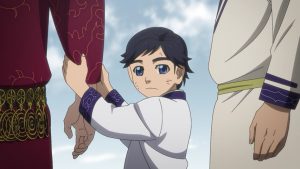 One might reasonably question whether an entire episode dedicated to Tsukishima’s history is essential to the story. And in literal terms, I imagine it probably isn’t. Yet my rejoinder would be to ask whether Golden Kamuy would really be Golden Kamuy if it didn’t make story decisions like this. If all of these characters didn’t have main character auras about them, this series would be nowhere near as compelling as it is. The journey is as important as the destination, and the textural quality of the narrative is its essential source of power.
One might reasonably question whether an entire episode dedicated to Tsukishima’s history is essential to the story. And in literal terms, I imagine it probably isn’t. Yet my rejoinder would be to ask whether Golden Kamuy would really be Golden Kamuy if it didn’t make story decisions like this. If all of these characters didn’t have main character auras about them, this series would be nowhere near as compelling as it is. The journey is as important as the destination, and the textural quality of the narrative is its essential source of power.
 As for the backstory itself, it’s certainly compelling in its own right. Tsukishima’s general demeanor makes perfect sense given his life story. This is a man who basically accepted that his life was over – as it literally would have been, had Lt. Tsurumi not had his death sentence overturned. It’s only his devotion to Lt. Tsurumi that drives him forward now – which is certainly ironic, given that it’s founded on a 9-year sequence of lies. But where do the lies stop, and the truth begin? I think that’s a valid question, because Tsurumi is the master of deception. Is there even a layer of truth in the puff pastry of fiction he’s been feeding Tsukishima?
As for the backstory itself, it’s certainly compelling in its own right. Tsukishima’s general demeanor makes perfect sense given his life story. This is a man who basically accepted that his life was over – as it literally would have been, had Lt. Tsurumi not had his death sentence overturned. It’s only his devotion to Lt. Tsurumi that drives him forward now – which is certainly ironic, given that it’s founded on a 9-year sequence of lies. But where do the lies stop, and the truth begin? I think that’s a valid question, because Tsurumi is the master of deception. Is there even a layer of truth in the puff pastry of fiction he’s been feeding Tsukishima?
 Indeed Tsukishima is certainly being manipulated. And I don’t think there’s any question he knows he’s being manipulated. But I don’t think he even cares which, if either, of the stories Tsurumi has been telling him is true – he has no future with Igousa either way. The fact that Tsurumi is willing to go to such extremes – to create such a detailed fabric of lies – for his benefit means as much to him as Tsurumi literally saving his life during the mortar attack. It’s a sick and twisted relationship and reason for living – but in a way it’s actually sort of moving.
Indeed Tsukishima is certainly being manipulated. And I don’t think there’s any question he knows he’s being manipulated. But I don’t think he even cares which, if either, of the stories Tsurumi has been telling him is true – he has no future with Igousa either way. The fact that Tsurumi is willing to go to such extremes – to create such a detailed fabric of lies – for his benefit means as much to him as Tsurumi literally saving his life during the mortar attack. It’s a sick and twisted relationship and reason for living – but in a way it’s actually sort of moving.
 This is really the magic of Lt. Tsurumi, perhaps the most fascinating character in this cast full of singular personalities. He’s damaged, twisted, criminal – but he’s also fanatically loyal to the men who serve him. Whether this is wholly calculation on his part almost doesn’t matter – he’s found the key to the castle. By being so ridiculously dedicated to his men, he ensures that they would do anything for him – no matter how shocking. Because they know he’d do the same for them. He almost certainly believes that his cause is just, and that any evil acts are justified in the service of that cause – and the fact that he can draw so many along in his wake makes him an incredibly dangerous figure.
This is really the magic of Lt. Tsurumi, perhaps the most fascinating character in this cast full of singular personalities. He’s damaged, twisted, criminal – but he’s also fanatically loyal to the men who serve him. Whether this is wholly calculation on his part almost doesn’t matter – he’s found the key to the castle. By being so ridiculously dedicated to his men, he ensures that they would do anything for him – no matter how shocking. Because they know he’d do the same for them. He almost certainly believes that his cause is just, and that any evil acts are justified in the service of that cause – and the fact that he can draw so many along in his wake makes him an incredibly dangerous figure.


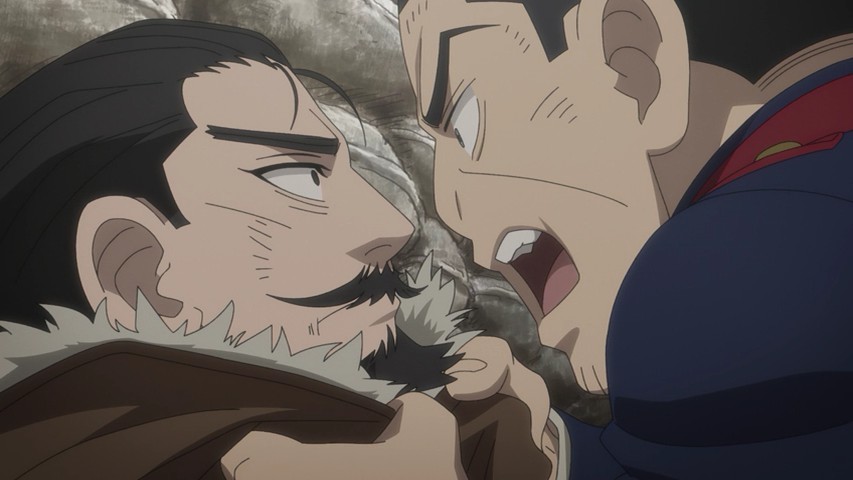
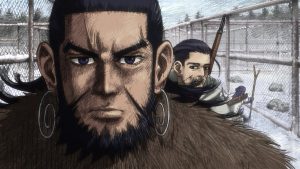
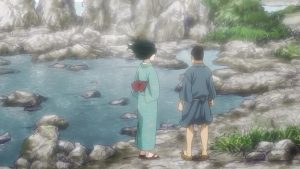
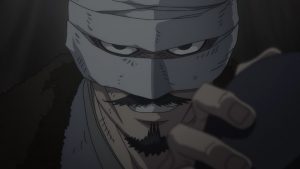

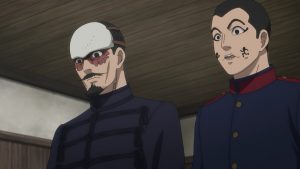
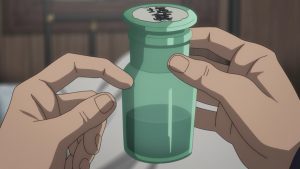
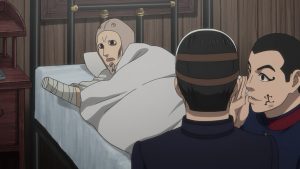
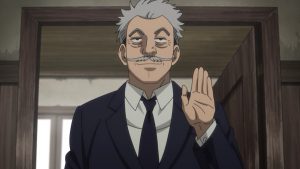
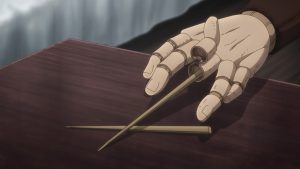
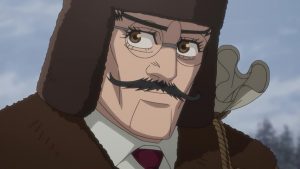
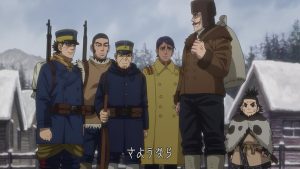
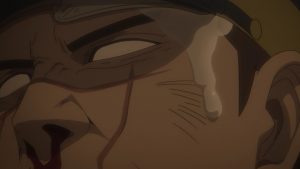
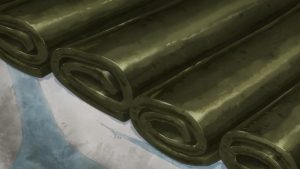
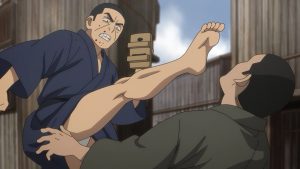
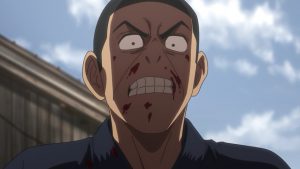

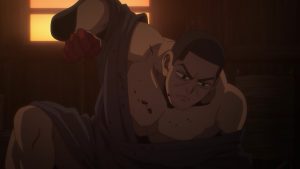
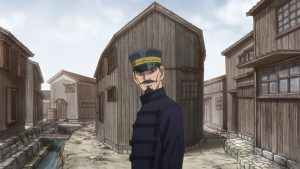

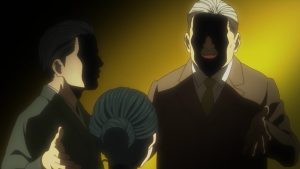
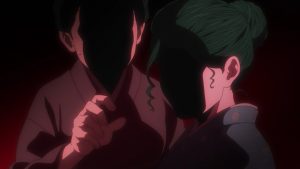
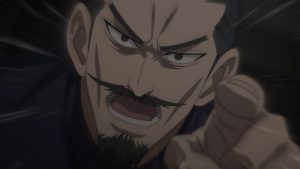

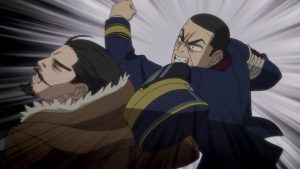

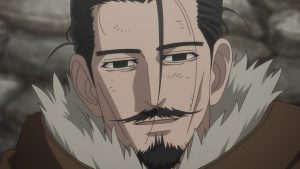
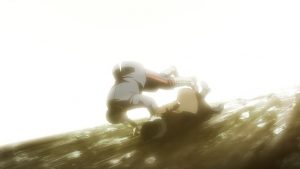
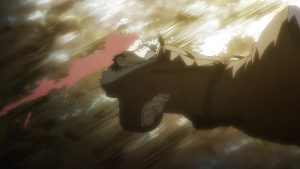


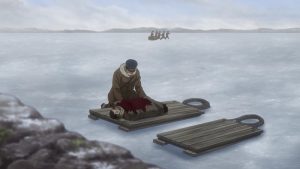


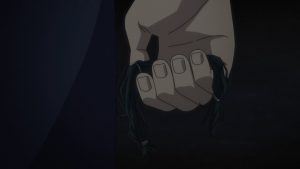

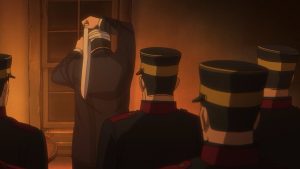
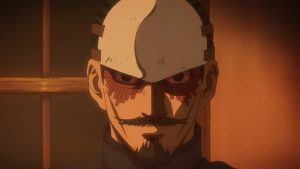


bennydelon
October 21, 2020 at 11:28 amThat scene at the end showing the origin of Tsurumi’s iconic look was really well done, it reminded me of moments like Darth Vader’s “birth” at the end of Star Wars Episode III, even though the characters and context are very different.
Also, this episode gave us the closest look at Tsurumi’s character that we have had so far. Now we know he’s from Niigata, he has been planning the Ainu stuff from even before the end of the war, and he seems to actually care about his subordinates (at least that’s the impression I got).
Guardian Enzo
October 21, 2020 at 1:13 pmThe only thing I would add to that is that I always felt he cared about his subordinates, even as he manipulates them to his own ends.